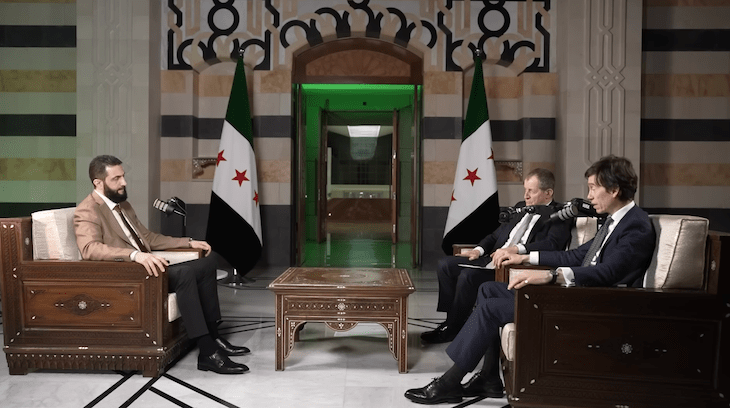There’s an old journalistic maxim: If it bleeds, it leads. But some crucial words are missing from the end: If we can hold the Jews responsible. It’s not by chance that most news organisations have more correspondents in Israel than in the rest of the Middle East put together. True, that’s partly because Israel – unlike its neighbours – is a democracy which allows dissenting voices, and is home to and welcomes a cacophony of both homegrown and foreign media voices. If you want to cover the Middle East, you’ll likely base yourself in Israel.
Al-Sharaa’s arrival as Syria’s de facto president was greeted not as the ascension to power of an almost Mandela-like figure
But it’s also because, well, Jews. Anyone who has seen coverage of the Gaza war over the past 16 months will have seen the venom – I’d call it glee – which is the foundation of so much reporting of what has been happening. Venom, that is, against Israel as some sort of uniquely evil state – and glee with which civilian casualties of the IDF’s military operation against Hamas can be reported, as if they somehow prove the point of Israel’s malignancy.
But it’s not just that when there is a way to portray the world’s only Jewish state as evil it will be seized. It’s also the opposite: if Jews aren’t involved, then no matter how much bleeding there may be, it won’t only not lead – it will barely be reported.
There have been few clearer demonstrations of this than the mass slaughter now taking place in Syria. What slaughter, you may be asking, if your only source of news is the mainstream media. (I have just got off the phone from an acquaintance who, I am sure, likes to consider himself well informed. When I told him about this piece, he literally asked me, ‘What slaughter?’).
Over the past few days, jihadis associated with the new Syrian president, Abu Mohammed al-Jolani (that’s his nom de guerre), aka now as Ahmed Hussein al-Sharaa, have been massacring Alawites, Christians and Druze civilians, dragging them from their homes, torturing them and butchering them in the streets in southern Syria. There has certainly been some coverage, mainly online – and also, to its great credit, by Channel Four News, which led its Friday bulletin with Syria.
But while accidental civilian casualties in Gaza – a consequence of Hamas deliberately basing itself in civilian areas – not only lead the news but are raised in Parliament, and are the supposed driving force behind hundreds of thousands taking to the streets in protest, you will hear barely a word about the slaughter by Muslims of other Muslims, along with non-Muslims.
This is not, of course, a new phenomenon. Muslim massacres by groups such as Boko Haram in Nigeria rarely generate more than perfunctory coverage. But when there are inevitable casualties in a war fought in self-defence against a terrorist group seeking Israel’s extinction, that is an opportunity that is never missed for mass coverage.
It’s not the only explanation for the absence of serious reporting of what is happening in Syria. I suspect much of this is also due to embarrassment.
Al-Sharaa’s arrival as Syria’s de facto president was greeted not as the triumph of a jihadi, with all the worry that should generate, but as the ascension to power of an almost Mandela-like figure who had moved from guns and terror to diplomacy and sagacity. There has, of course, been not a shred of evidence for this beyond the jihadi himself saying this while wearing a suit – and yet, one after another, the likes of Jeremy Bowen have seemed to think that anything al-Sahraa said should be taken at face value. In his interview with the jihadi president, the BBC’s international editor appeared to think that because al-Sharaa was wearing a suit he had morphed from being one of the most dangerous jihadis on earth into some kind of centrist dad.
But Bowen was a model of journalistic rigour compared to the Abbott and Costello of international analysis, Alastair Campbell and Rory Stewart. Their The Rest Is Politics podcast draws in millions of listeners, which is one of the great unexplained mysteries of the modern world – up there with why Mrs Brown’s Boys is so popular, although the latter offers deeper and more reliable insights into world affairs than Cannon and Ball’s podcast offerings.
Last month, the Laurel and Hardy duo flew to Damascus to interview al-Sahraa – or rather, as Campbell posted:
“This is why we were in Syria. Long interview with fighter turned President Ahmed al-Sharaa…Fascinating on so many levels.”
If the issue wasn’t so tragic and so devastating, the credulousness of a pair of self-advertised gurus in describing a jihadi terrorist as a “fighter turned President” because he looks plausible in a suit would be comical. But it is anything but amusing.
When Israel reacted to the fall of Assad by sending in planes to destroy Syria’s chemical weapons, planes, tanks and munitions stockpiles to ensure they did not fall into the hands of jihadis, it was reported as if Israel was engaged in some sort of aggressive act of war, rather than taking defensive action any serious state would consider as basic. More recently, the IDF has been preparing to enter the suburbs south of Damascus to protect Druze communities. Again, the IDF build up has been reported as Israel seeking conflict. The likes of Bowen, Campbell and Stewart may be wrong about almost everything, but they are far from alone. Rather, they are emblematic of the triviality and deep ignorance that too often passes for insight.







Comments